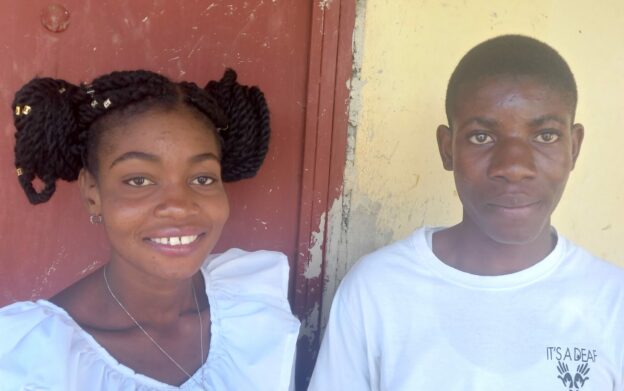Chitine and Julme live in Makari, an agricultural area in the mountains above Marigo, in Haiti’s Southeast. She’s twenty, and he’s nineteen. Both of them come from CLM families.
Chitine’s one of eight children. “We were all living in a one-room shack. CLM helped my mother build two more rooms, so we finally had some space.”
Her mother also struggled to keep the children fed and in school. Only three of the kids living under her roof could attend. She couldn’t afford to send them all. Julme and his siblings had the same problem. At 19, he is a fourth grader because his mother was not able to afford to send him to school every year. “We could not always go.” The CLM program invested in both of their mothers, helping them establish the sources of income they need to take care of their kids.
But the CLM program’s founding director, Gauthier Dieudonné, saw a problem. His program was succeeding at helping women establish livelihoods that they could grow, just as it helped the mothers of Chitine and Julme. And the women and the families were changing their lives in other ways as well.
One of the most important was that school attendance had increased for participants’ children. And that was proving to be a lasting change. Studies of the families that were done years after their graduation from the program showed that the children were still in school.
But Gauthier thought about members’ older children, kids in their late teens or even early twenties who were too old to go back to school easily or to get very far with standard education even if they did. Julme is in school this year, but though Chitine says she will go, it is February, and she has not started yet. Gauthier worried that they could easily slip into the poverty their mothers were just escaping from if no effort was made to help them establish a way to begin their own adult lives. He started to dream of establishing schools just for them, which would offer a strong, if minimal, academic grounding; education in life skills like healthy practices and personal finance; and training to help them start in a trade or another way to earn a living.
So for years he looked for a way to help such young people directly, and he and Fonkoze finally found a chance to do so as part of larger CLM implementation. We have not yet been able to implement Gauthier’s full vision, but we made a start. Older children from CLM families were invited to join clubs that the program set up in their neighborhoods. Children from other families, with similar profiles, were invited as well. The young people received training in life skills and in personal finance. They had the chance to learn a trade, such as cosmetology or ceramic tiling. They were organized into savings and loan associations, and learned farming techniques. They received funds to invest in new economic activities. Like their mothers, they had the chance to graduate after eighteen months.
When asked how the program helped them, Chitine and Julme point, first and foremost, to progress in their social lives. Julme says that he met new people and made new friends. “I got to know a bunch of people I couldn’t have hoped to meet.” Chitine talks about how comfortable she is now talking to people, even talking in front of people.
She also talks about her new profession. “I learned cosmetology. I was able to make money around the holidays doing people’s nails.”
They both also learned good farming techniques. And this is where things get interesting. Because they both planted gardens on land that belongs to their parents, and neither garden succeeded. Chitine explains. “We planted eggplants and peppers, but the plants just dried up.”
But they both looked carefully at what happened, and they both think they know what went wrong. Julme explains that the land itself wasn’t strong enough, and that they have begun strengthening it through composting techniques that they learned in their club.
So they are both ready to give their gardens another try. Thanks to their parents’ experiences in CLM, finding the resources they need to reinvest in their gardens won’t be difficult. Chitine says, “My parents are happy that I am farming, and they’ll help me with what I need to plant my field.”
